Finding Purpose After Your Career: Redefining Your Identity in Retirement
As you near retirement, you might feel both excited and nervous. Leaving behind a career that has shaped you for years can be scary. But you're not alone. Many retirees face the challenge of finding a new purpose and identity after work.
Retirement is more than just planning your finances. It's also about getting ready emotionally and mentally. The change can be tough, making you feel lost without your job's structure and purpose. Yet, this time can also be a chance for growth and discovering yourself2.

In the UK, retirement is changing. Baby boomers in their 50s and 60s are redefining what retirement means. Many are choosing to keep working or start new paths in life. There's a growing focus on finding joy, vitality, and meaning in retirement1.
This article will help you find purpose after your career. We'll tackle the emotional challenges and show you how to find new ways to be fulfilled. You'll learn how to redefine your identity, build strong relationships, and make a difference in your retirement years.
Key Takeaways from this Article:
Retirement can lead to an identity crisis and emotional challenges
Early preparation is crucial for a smooth transition
Redefining success beyond professional achievements is important
Building new relationships and maintaining existing ones aids well-being
Exploring new opportunities for personal growth enhances retirement life
Contributing to society through volunteering can provide a sense of purpose
Creating a balanced lifestyle is key to a fulfilling retirement
Understanding the Identity Crisis in Retirement
Retirement is a big change that can affect how you see yourself. Moving from a job to retirement can bring unexpected challenges. One of these is a retirement identity crisis.
The Psychological Impact of Leaving Your Career
Stopping work can deeply affect your mind. People retiring, and those in their first year, are at a higher risk of heart attacks or strokes3. This shows how retirement can impact your health.
The change can lead to stress, depression, and mental health problems like clinical depression or anxiety3. It's important to know these risks and get help if needed.
https://youtube.com/watch?v=IRCZ1Mt2a8M
Common Emotional Challenges During Transition
Retirees often feel sad, lonely, guilty, and anxious3. Adjusting to a new routine and finding new reasons to get up in the morning can be hard. About 25% of retirees struggle, leading to bad outcomes4.
Jay retired at 63 but found it hard to find meaning and purpose5. He's not alone in this struggle.
Breaking Free from Work-Based Identity
It's key to move past your job identity for a happy retirement. Setting new goals and finding a new sense of self can help3. Jay, for example, found purpose by writing a book, starting an online magazine, and teaching at a local school5.
Building strong social connections and joining retirement programmes can help with stress, anxiety, and feeling left out3. Remember, retirement is a chance to discover new parts of yourself and find new ways to be fulfilled.
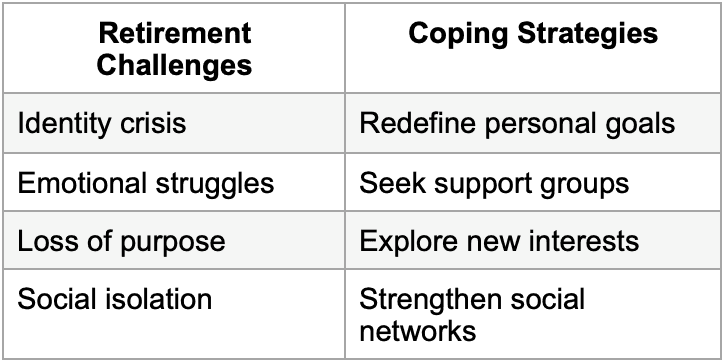
Retirement Emotional and Mental Preparation in the UK
Planning for retirement in the UK is more than just money. It's about getting ready emotionally and mentally. Moving from a busy schedule to more free time can be hard. Finding activities that mean something might be tricky6.
Keeping in touch with old colleagues is key for emotional health. Volunteering can improve sleep and lower blood pressure. Joining clubs or groups can also grow your social circle6. Aim for 150 minutes of exercise weekly to fight depression67.

The NHS Health Check programme offers free health checks for those 40-74 every five years7. Daily mindfulness and getting a pet can also boost happiness and reduce loneliness7.One in five older people in the community face depression or poor mental health8. Resources like Samaritans, Cruse Bereavement Support, and Age UK provide emotional support and advice8.
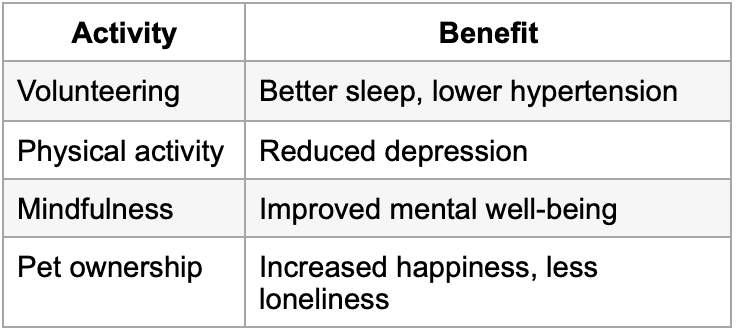
Retirement age and state pension age are different in the UK. Many over 50 are exploring new paths, like volunteering or education8. These steps can bring new energy to retirement7.
Discovering Your Core Values in Post-Career Life
Retirement is a chance to find yourself again and live life on your terms. Knowing your core values is key to a happy and meaningful retirement.
Identifying Personal Strengths and Passions
Think about when you felt most happy in your career and life. Career advisors use special tools to help find the right path for you9. You can also use online tools to figure out your values and make choices9.

Aligning Activities with Values
After finding your values, choose activities that match them. This might mean trying new hobbies, helping others, or starting a new career10. It's about more than just money; it's about feeling fulfilled and making a difference.
Creating a New Vision for Your Future
Make a retirement plan that shows what you value and want. It should include your ideal lifestyle, relationships, and how you want to help others. Growth and learning are important in a new career, keeping you happy and sharp10.
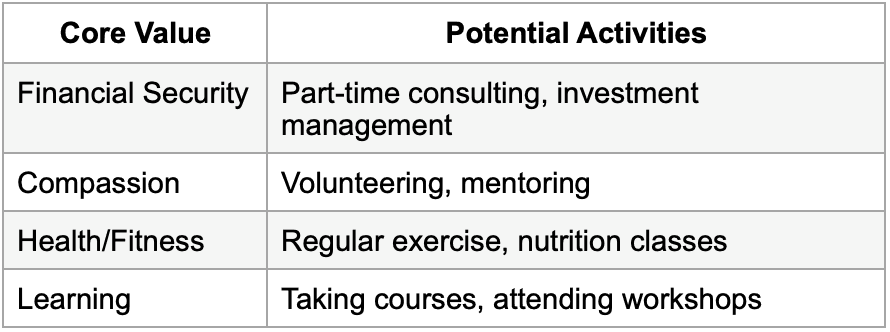
By doing things that match your values, you can have a fulfilling retirement. Remember, your plans might change, so be ready to adjust9.
Redefining Success Beyond Professional Achievement
As you move into retirement, it's key to look beyond work achievements. Many retirees struggle to find a new definition of success. This new definition goes far beyond the office11.
Success in retirement isn't about promotions or more money. It's about enjoying daily life, building strong relationships, and following your dreams. Achievements might include learning a new skill, helping out in your community, or spending time with family.
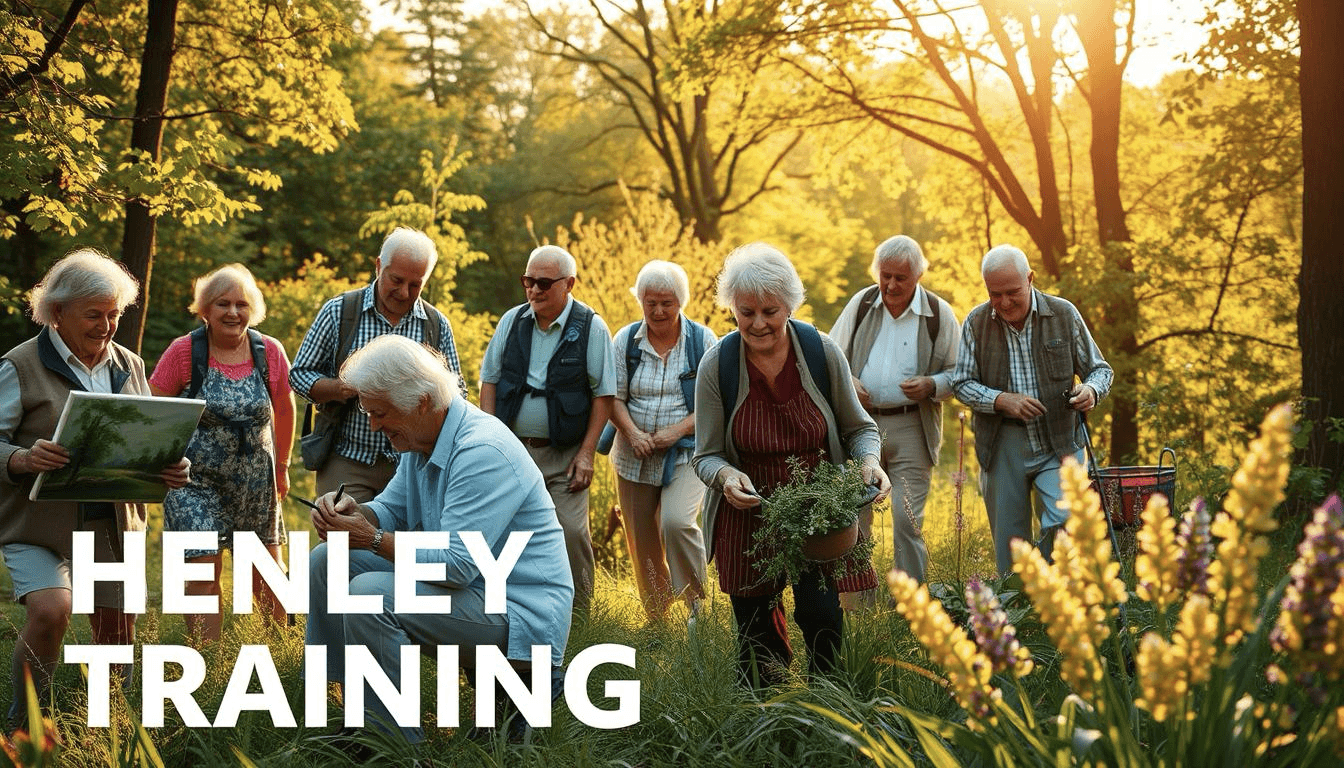
Arianna Huffington suggests a third way to measure success, beyond money and power. This includes well-being, intuition, wonder, compassion, and giving12. Adopting these values can make your retirement more balanced and fulfilling.
To redefine success in retirement:
Set personal goals that aren't work-related
Find joy in hobbies or helping others
Measure success through personal connections and experiences
Focus on your well-being and personal growth
Success in retirement is personal. What fulfils one person might not another. The important thing is to try different activities and find what truly makes you happy and fulfilled in your post-work life.
"Success is not final, failure is not fatal: it is the courage to continue that counts." - Winston Churchill
By seeing success in a new light, you can make your retirement rich with purpose, joy, and growth. Your retirement years are a chance to redefine achievement for yourself. This can lead to a more rewarding and meaningful life after work.
Building Meaningful Relationships in Retirement
Retirement is a great time to make and strengthen friendships. It's important to focus on building relationships that make your life richer and support your health.
Maintaining Professional Networks
Keeping in touch with old colleagues can give you a sense of purpose. You can join professional groups or go to industry events. These connections might lead to new work or mentorship chances, letting you share your knowledge.
Creating New Social Connections
Retirement is a perfect time to meet new people. Join clubs, classes, or groups that interest you13. Talking regularly with friends, neighbours, and new friends is key for staying engaged and keeping your mind sharp.
Volunteering is a great way to make friends while helping others14. Studies show that volunteering can make older people feel happier and healthier, as long as they find it rewarding.
Strengthening Family Bonds
Retirement gives you lots of time to bond with family. Spend time with grandkids, plan family events, or do activities together13. Connecting with different ages, like grandkids, can make your retirement more fulfilling.

Building and keeping social connections in retirement is good for your health and happiness13. Positive relationships and activities can help older people stay sharp and live better lives.
Exploring New Opportunities for Personal Growth
Retirement opens doors to exciting avenues for personal growth. It's a chance to embrace lifelong learning and dive into new hobbies. Many retirees find this transition challenging, often feeling a mix of excitement and anxiety about the future15.
To combat these feelings, it's crucial to focus on the positive aspects of retirement. Engaging in fulfilling activities and setting goals can provide a sense of purpose and structure15. Consider taking up volunteer work or activities that utilise your existing skills to maintain a sense of achievement and contribution16.
Lifelong learning is a fantastic way to keep your mind sharp and expand your horizons. Adult education classes offer opportunities to learn new skills or dive deeper into subjects that interest you16. From language courses to art workshops, the possibilities are endless.
Retirement hobbies can also play a significant role in personal growth. They provide structure to your day and offer chances for social interaction. Many retirees find joy in activities like:
Gardening
Photography
Cooking
Writing
Painting
Remember, staying physically active is equally important. Activities like yoga or sports can boost your mood and reduce feelings of depression17. Many retirement communities offer on-site Wellbeing Advisors and Activities Coordinators to help you stay active and engaged15.
Embracing new experiences and pushing beyond your comfort zone is key to continued growth in retirement. Whether it's travelling to new destinations or joining social clubs, these activities can enrich your life and combat feelings of boredom or isolation17.
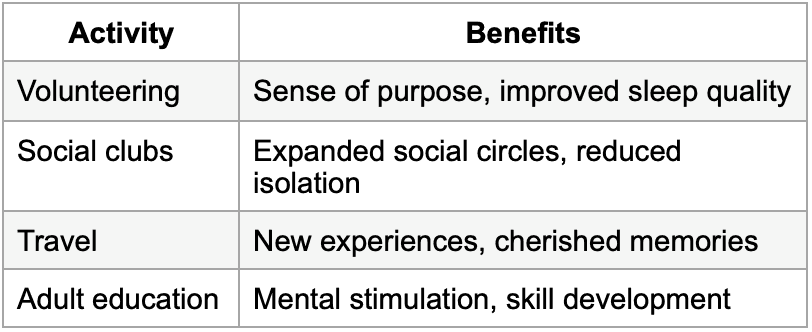
By embracing these opportunities for personal growth, you can create a fulfilling and enriching retirement experience. Remember, it's never too late to learn, explore, and grow.
Contributing to Society Through Alternative Channels
Retirement brings new chances to help others. Many retirees find joy in giving back to their communities. They do this through different ways.
Volunteering and Community Engagement
Retirement volunteering is a great way to help others. You can join local charities, community centres, or groups that protect the environment. These activities help others and give you a sense of purpose.
Mentoring Opportunities
Mentoring in retirement lets you share your knowledge with others. You could help students, young professionals, or entrepreneurs. This sharing of wisdom is rewarding for both you and the mentee.
Social Impact Projects
Working on social impact projects can change your community for the better. You might start a community garden, help with fundraisers, or tackle local issues. These projects can make you feel accomplished and relevant.
By getting involved in community activities, you help society and stay active. A study showed that retirees who do this are happier18.
Remember, retirement is a chance to redefine your role in society. Exploring these options can lead to a fulfilling life and a positive impact on others.
Creating a Balanced Lifestyle in Retirement
Getting a good balance in retirement is key for a happy life. You should plan your days with different activities but also keep some free time. Many people worry about retiring, with 58% of those over 40 feeling anxious about it19.
Staying active is important for your health. Walking 8,000 to 12,000 steps a day can help you live longer and feel happier19. Start getting more active before you retire to keep up the good work.
It's also crucial to keep your mind sharp. Helping others through volunteering can make you feel more fulfilled and improve your sleep20. Traveling can also make you happier and give you memories to treasure20.
Keeping in touch with friends and family is also vital. Having a strong support network can fight off loneliness, a big issue for many retirees2021. Remember, 86% of adults think finding purpose in retirement is key to happiness19.
By focusing on staying healthy, keeping your mind active, and staying connected, you can enjoy a fulfilling retirement. This approach supports active ageing and improves your overall well-being.
Conclusion
Retirement planning is a journey of self-discovery and adaptation. It's about finding purpose in retirement and using effective strategies for the transition. Your post-career life is a chance to redefine yourself and explore new passions22.
The importance of lifelong learning in retirement is huge. A study found that 75% of quotes on retirement stress the need for continuous education. This is because 40% of these quotes highlight its role in personal growth22. Also, a scoping review on planning for later life found 116 papers, showing how important preparation is23.
Your retirement journey may have challenges, but see them as chances to grow. Remember, 15% of retirement quotes say mistakes are valuable for learning22. By embracing change and focusing on personal development, you can lead a fulfilling life that shows who you are and helps others.
As you start this new chapter, think about what affects retirement planning. Studies show that income, housing, education, and gender all matter in retirement readiness23. By understanding these factors and tackling any barriers, you can smoothly transition and find new purpose in retirement.
FAQs
How can I prepare emotionally for retirement in the UK?
To get ready emotionally for retirement in the UK, start by understanding how it changes you. Look into ways to keep your mind healthy, like getting professional help or joining pre-retirement programmes. Also, find activities that make you feel good.
Use UK resources to help you smoothly move into retirement.
What are common emotional challenges during the retirement transition?
Feeling left out, questioning your purpose, and missing work's structure are common feelings. Many struggle with finding a new identity after leaving work. It's key to acknowledge these feelings and find new ways to define yourself.
How can I discover my core values in post-career life?
To find your core values after work, think about what's important to you. Look at your strengths and passions, and do things that match these. Setting meaningful goals can help you create a new vision for your life.
Try journaling, strengths surveys, and self-reflection to discover and align with your values.
How can I redefine success after retirement?
Redefining success means focusing on personal growth and happiness, not just work achievements. Set goals that aren't work-related, find joy in hobbies or helping others, and measure success through personal connections and experiences. Success in retirement is personal and can take many forms.
What are some ways to build meaningful relationships in retirement?
To build strong relationships in retirement, stay in touch with old friends and make new ones. Join clubs, classes, or volunteer to meet people. Spend time with family and get involved in your community to feel connected and purposeful.
Seek out social activities and care for both old and new friendships.
How can I explore new opportunities for personal growth in retirement?
Discover new things in retirement by trying hobbies, learning new skills, or taking courses. Challenge yourself to keep your mind sharp and feel a sense of achievement. Stay open to new experiences and grow beyond your comfort zone.
What are some ways to contribute to society after retirement?
You can help society after retirement by volunteering, getting involved in your community, or mentoring. Use your skills and experience for good. Engage in projects that make a difference in your area. These activities give you a sense of purpose and relevance.
How can I create a balanced lifestyle in retirement?
To live a balanced life in retirement, mix activities, rest, and personal growth. Keep fit, do things that challenge your mind, and make time for relaxation. Plan your days with variety but also be flexible. A balanced life leads to happiness and well-being in retirement.
How can I address the identity crisis that may arise from leaving full-time work?
To deal with the identity crisis from leaving work, redefine yourself beyond your job. Explore new parts of your identity and find new meanings and happiness. Reflect on yourself to find new passions and interests. Retirement is a chance to discover new aspects of yourself and create a new, meaningful identity.
What UK-specific resources are available for retirement planning?
For retirement planning in the UK, check out Pension Wise guidance and financial advice from experts. Look into pre-retirement courses from employers or independent groups. Age UK offers great support and information for retirees. Local councils also have resources and programmes to help with retirement.
Are you ready to embrace this next chapter with clarity and intention? If you want to bring growth, health, and joy to your later years, check out our three-day Reflective Retreat that’s designed specifically for people just like you.
Click here to find out more: https://www.henleytraining.co.uk/reflective-retreats
Source Links
https://www.amazon.co.uk/Joy-Retirement-Finding-Happiness-Freedom-ebook/dp/B0080GUK9C
https://www.helpguide.org/aging/healthy-aging/adjusting-to-retirement
https://ageing-better.org.uk/sites/default/files/2018-12/Transition-to-retirement.pdf
https://podcasts.apple.com/gb/podcast/the-humans-vs-retirement-podcast/id1676607479
https://denisetaylor.co.uk/the-art-of-rest-redefining-recovery-in-active-later-life/
https://www.amazon.co.uk/Thrive-Redefining-Success-Creating-Well-Being/dp/0804140863
https://www.extracare.org.uk/news/preparing-for-retirement-emotionally/
https://www.caba.org.uk/career/approaching-enjoying-retirement/preparing-for-retirement.html
https://taking.care/blogs/resources-advice/preparing-for-retirement-emotionally
https://blueskyifas.co.uk/7-ways-to-ensure-you-are-emotionally-prepared-for-retirement/
https://www.pensionbee.com/uk/pensions-explained/retirement-planning/mental-health-in-retirement
https://cpduk.co.uk/news/the-importance-of-retirement-planning-in-the-uk

